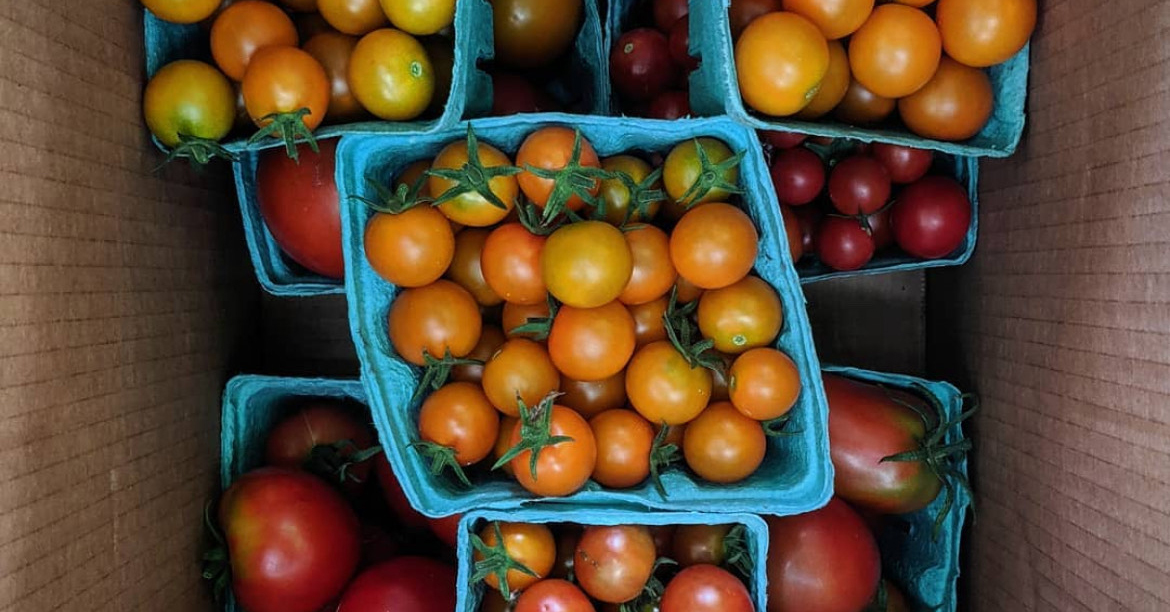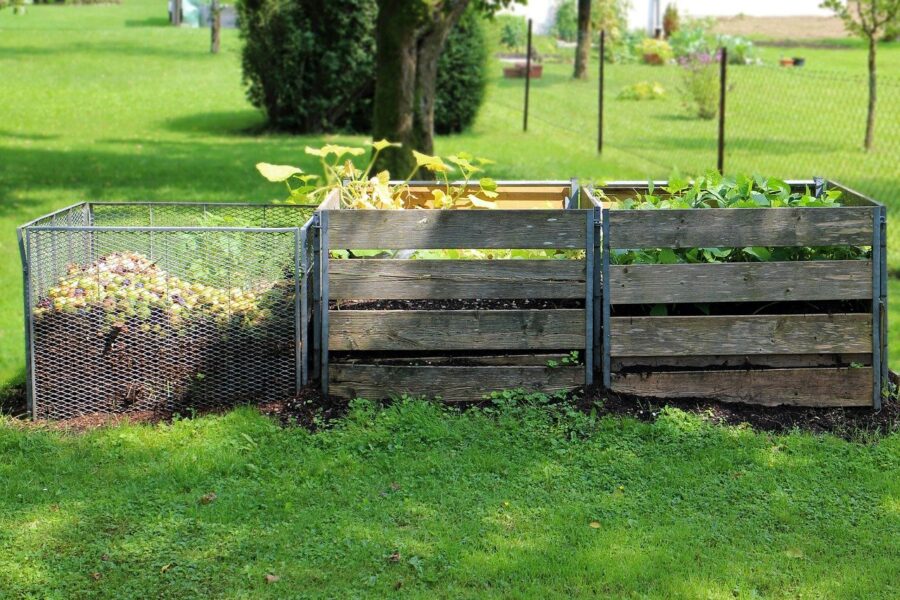On Antioch University’s New England campus, behind a parking lot just down the road from a gas station, a medium-sized garden is tucked away. It’s comprised of several raised beds, flowers planted around the perimeter, and a few picnic tables under some trees, where students can often be found between classes. Though the garden is in many ways modest, over the last 14 years, it has provided a space for dozens of Antiochians to grow as gardeners, community activists, and environmental stewards. And despite this long tenure, the underlying project continues to evolve, grow, and expand to meet the needs of the community on campus and in the wider Keene community.
“We have initiated a new practice in which one of our weekly meetings per month is focused on justice and equity issues within the food system,” says Juliana Stoner, a second-year student in the MS in Environmental Studies who is employed as one of the Co-Coordinators of Community Garden Connections, the larger organization behind the New England Campus Garden. Stoner’s innovation comes partly out of Antioch’s emphasis on centering social justice—and out of her coursework and the conversations she and her peers have about justice and equity issues within the food system. For Stoner, being able to bring this focus more deeply into the structure of the organization gives the project another way “to align with our mission of serving the most vulnerable communities with our actions.”
For Libby McCann, the faculty advisor for Community Garden Connections, this type of service to community and its student-centered nature has been key since the project’s founding in 2010. “I wanted some sort of immersive experience for students where they could gain practical professional applied learning opportunities,” says McCann. “Even if they didn’t go on to do food justice work, they would still know how to do authentic community engagement, how to design programs and workshops, how to do budgets, and how to do evaluations in culturally responsive ways.”
The New England Campus Garden and the other gardens started by Community Garden Connections around Keene are deeply rooted in climate justice and food equality. They also showcase the importance of program development and working within a team setting. Perhaps most importantly, they demonstrate the value of community collaboration and mutuality.
Founded as an Interdisciplinary Initiative to Meet Community Needs
In 2010, McCann, along with two other faculty in the Environmental Studies Department—Tom Wessels and Tania Schusler—founded Community Garden Connections. To do this, they built community relationships and created plans for student-run gardens. Soon, the garden on campus was established, and then they began creating further gardens in the Keene community. This work has continued over the intervening 14 years. Over this time, another big contributor to the project was former faculty member Jean Kayira, who for ten years served alongside McCann as the organization’s faculty advisor.
Today, the operation is no small feat. The garden beds on the New England campus have led to establishing over 70 garden beds across Keene. These gardens have found a permanent home across settings ranging from the local senior center to apartment complexes and businesses. “Essentially, we work with local agencies, nonprofits, and businesses dedicated to increasing access to locally grown food and fostering authentic relationships among community members they engage,” explains McCann. “The gardens are a tool to do so.”
When organizations collaborate with Community Garden Connections to establish their own gardens, they customize what they grow in their garden beds to meet the interests and needs of their communities. Many organizations also continue to grow and expand from the initial beds offered by Community Garden Connections—up to six raised beds, each three feet tall to be more accessible—to create larger gardens. For instance, Harper Acres, which started with Community Garden Connection’s six beds installed over two seasons, now has over 50 garden beds across multiple affordable community housing sites. They even hired a full-time community garden programs coordinator–who happens to be an Antioch alum and prior Community Garden Connections staff member. As McCann says, “It’s so great to see how this program and a student’s applied community-based learning experiences led to a professional role in that very capacity. Small world indeed!”
Community Garden Connections is made possible partly through the generosity of the Aaron Rashti Family Foundation. McCann says that they have been able to leverage this support to garner additional funding in partnership with local agencies and key collaborators.
“Lots of these collaborations are made possible locally because of Antioch graduates doing amazing work beyond their graduate studies and who remain in the region,” she says. One example is Amanda Littleton, an alum who now leads the Cheshire County Conservation District—a Community Garden Connections partner. Another Environmental Studies alum, Sarah Harpster, is the current director of The Keene Community Kitchen, a longstanding nonprofit that runs a pantry program as well as a hot meal delivery program. Through the Westmoreland Garden Project site, workplace garden sites, and in-town garden beds, the student staff and community members who make up Community Garden Connections have planted, tended, harvested, and donated over eight tons of food to The Keene Community Kitchen.
A Deep Connection to the Soil
For McCann, Community Garden Connections continues a lifelong connection to food production and the blending of agricultural and food justice work with community engagement. She grew up on a farm in Kentucky, gaining firsthand exposure to the overlap between agricultural pursuits and the needs of local towns. In her college years, McCann took a course on world hunger and food justice, later interning with food justice initiatives and learning about food accessibility needs across the country. She holds a PhD in Adult Education with an emphasis on environmental education and community engagement.
McCann’s passions each intersect with her work as a professor and faculty advisor for Antioch Community Garden Connections. This project aligns well with externally funded national projects related to authentic community engagement, environmental education, and culturally responsive, equitable evaluation. Having a local initiative like Community Garden Connections keeps these national efforts grounded in local concerns and applications for students and faculty alike.
Practical and applied learning opportunities, similar to McCann’s own education, are just what students are given throughout their work with Community Garden Connections. Graduate students, mainly within the Environmental Studies department, run the full program. McCann is consistently impressed with students’ dedication and willingness to work and learn alongside each other and community members as they serve in this professional role while in school. “I think it replicates whenever you have a new job, and you think ‘whoa, I don’t know what to do.’ As uncomfortable as that is, knowing that you can muddle through and have success at the end of the day is really valuable in the long term.”
For Stoner, this has been her experience as a student co-coordinating this multifaceted community-based initiative. Beyond pushing for one meeting a month to focus on social justice issues, Stoner has also been growing in many different areas and skills. She describes the ways Antioch Community Garden Connections helps address both pride and food access needs. She explains, “We run community education events on gardening and food access, as well as working alongside social service organizations in the area to establish and maintain garden sites.”
An Ongoing Project for the Common Good
While so much is already underway at the Community Gardens, there are still plenty of future directions, initiatives, and future evolutions in the works. There are regular open volunteer hours for those interested in agriculture and food justice to participate, as well as regularly scheduled community events, initiatives, and educational opportunities to learn about food justice, good growing practices, and community and accessibility needs. Academic internships, student coursework, and scholarship opportunities for Environmental Studies students are also available for current Antioch students on the New England campus.
The Environmental Studies department has been working to create more accessible online learning options, which are valuable for students unable to study on campus in Keene. Still, McCann believes that certain opportunities—like the chance to work with Community Garden Connections—are by their nature in-person, immersive experiences and that there is a special value to working together on hands-on learning opportunities.
McCann brings passion, care, and energy to Community Garden Connections and into the broader mission of food accessibility—and there are enough proud stories and accounts of student and alumni projects to fill a book. “I’m just so inspired and humbled by what students do,” says McCann, “And I’d say that’s been true since the get-go.”
For Stoner, the experience has also been humbling. “I have been incredibly grateful to be a part of Community Garden Connections during my time at Antioch,” she says. “It has been a source of community and hopeful action.”






